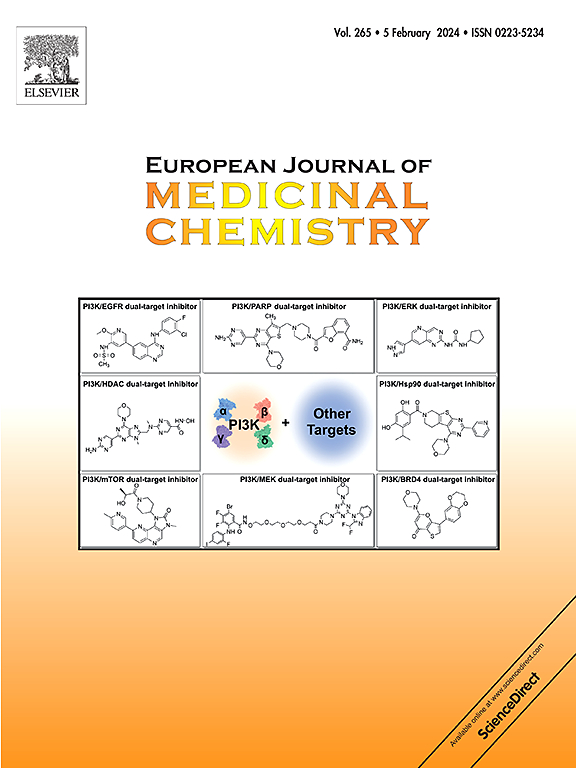通过赖氨酸靶向共价策略发现携带丙氨酸酰胺片段的新型共价PI3Kδ抑制剂
IF 6
2区 医学
Q1 CHEMISTRY, MEDICINAL
引用次数: 0
摘要
PI3Kδ参与广泛的细胞过程,包括细胞生长、增殖和分化,使其成为治疗血液肿瘤最有价值的靶点之一。在此,我们通过赖氨酸靶向共价策略设计开发了一系列带有丙氨酸酰胺片段的新型共价PI3Kδ抑制剂。最佳化合物M7含有酚酯战斗部,对PI3Kδ具有较强的体外生物活性和选择性。此外,M7对SU-DHL-6和Pfeiffer细胞具有明显的抗增殖活性。M7显著降低p-AKT水平,阻滞细胞周期,诱导细胞凋亡。冲洗实验表明M7持续抑制SU-DHL-6细胞,并持续抑制p-AKT的表达。蛋白质谱分析证实M7与PI3Kδ的K779通过酰胺键形成共价结合。该研究扩大了赖氨酸靶向共价设计的范围,并为开发新型有效的共价PI3Kδ抑制剂提供了坚实的基础。本文章由计算机程序翻译,如有差异,请以英文原文为准。


Discovery of novel covalent PI3Kδ inhibitors bearing alaninamide moiety by lysine-targeted covalent strategy
PI3Kδ is involved in a wide range of cellular processes, including cell growth, proliferation and differentiation, making it as one of the most valuable targets for the treatment of hematologic tumors. Herein, we developed a series of novel covalent PI3Kδ inhibitors bearing alaninamide moiety by lysine-targeted covalent strategic design. The optimal compound M7, containing the phenolic ester warhead, demonstrated excellent in vitro strong bioactivity and selectivity for PI3Kδ. Furthermore, M7 exhibited potently antiproliferative activity against SU-DHL-6 and Pfeiffer cells. M7 significantly reduced p-AKT levels, arrested the cell cycle and induced cell apoptosis. Wash-out experiments demonstrated that M7 sustained the inhibitory effect on SU-DHL-6 cells and inhibited p-AKT expression consistently. Protein mass spectrometry confirmed the covalent binding of M7 to K779 of PI3Kδ through amide bonding formation. This study expanded the scope of lysine-targeted covalent design and provided a strong foundation for the development of novel, potent covalent PI3Kδ inhibitors.
求助全文
通过发布文献求助,成功后即可免费获取论文全文。
去求助
来源期刊
CiteScore
11.70
自引率
9.00%
发文量
863
审稿时长
29 days
期刊介绍:
The European Journal of Medicinal Chemistry is a global journal that publishes studies on all aspects of medicinal chemistry. It provides a medium for publication of original papers and also welcomes critical review papers.
A typical paper would report on the organic synthesis, characterization and pharmacological evaluation of compounds. Other topics of interest are drug design, QSAR, molecular modeling, drug-receptor interactions, molecular aspects of drug metabolism, prodrug synthesis and drug targeting. The journal expects manuscripts to present the rational for a study, provide insight into the design of compounds or understanding of mechanism, or clarify the targets.

 求助内容:
求助内容: 应助结果提醒方式:
应助结果提醒方式:


